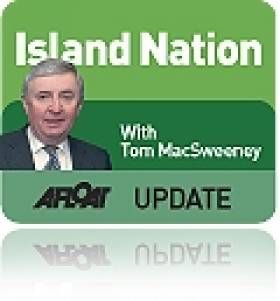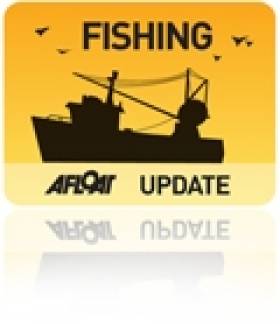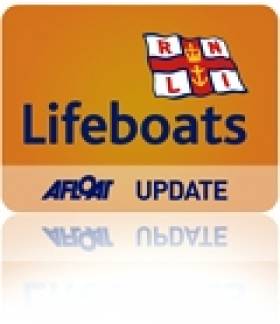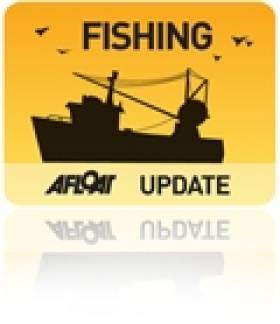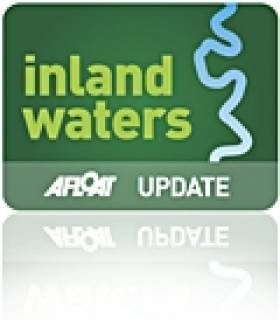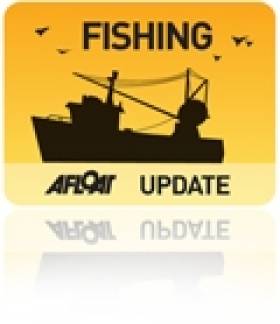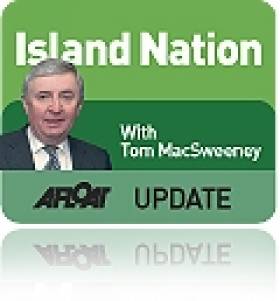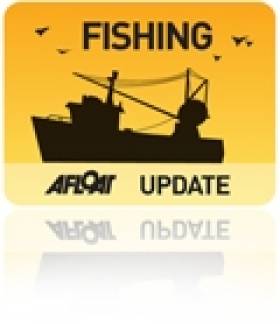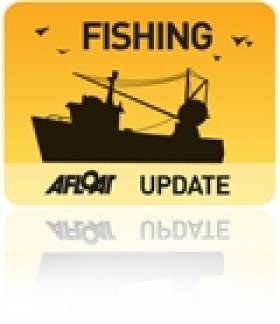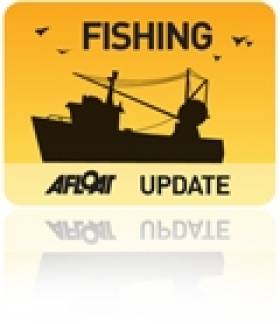Displaying items by tag: Fishing
Giving Away a Billion from the Sea
I had to read the figures twice to make sure that I was seeing them correctly. The second reading made me even more angry than the first.
They were, at last, a definitive figure of how much the stupidity of Irish politicians and the ignorance and disregard of the maritime sphere by the Government have cost this nation – over a billion Euros in one year.
There is no way the Government can weasel its way out of this revelation, nor any excuse the un-named civil servants responsible can make to avoid the accusation that this is a massive economic waste.
The Marine Institute is the Government's own respected authority on maritime affairs, the voice of the State on marine research and it has valued the total available catch of fish off Ireland last year at €1.18 billion, for a total of 994,155 tonnes.
That is an enormous figure, indicating huge potential wealth for this cash-strapped nation in the middle of an economic disaster. But of this total value of seafood, Ireland was only entitled to catch €0.19 billion. Foreign fishing fleets had exclusive rights to take the rest of the fish from Irish waters.
No wonder I had to read the figures a second time to make sure I was seeing them correctly at a time when the value of our food exports has been shown to be one of the top earners for the nation. How much more could have been earned if Irish fishermen could catch all that fish and have it processed in Ireland, creating onshore jobs in ancillary businesses as well as at sea?
The total value for 2010 could be even higher than €1.18 billion because the Institute prepared its figures in advance of the annual fisheries negotiations in Brussels in December. Ireland as a nation and the country's fishing industry in particular are likely to have lost out even more heavily to other EU countries.
Effectively, Ireland handed over around €1billion of its natural economic resources to other EU countries. Mark McCarthy, Editor of The Marine Times, the national fishing industry paper, described the figures as "truly frightening."
"This is a nation with some of the richest fishing grounds in the world where the coastal communities are being financially starved and frustrated through their inability to catch their own fish, because they are not allowed to do so."
It is hardly any wonder that Irish fishermen, forced to tie up their boats at the quaysides of Irish fishing ports and watch as foreign vessels unload into those ports, are bitter and frustrated.
Ebbie Sheehan of Castletownbere, Chairman of the Irish Fishermen's Organisation, asks why fishermen are "so badly treated when we look at the economic situation today?"
The Marine Institute, our national maritime scientific and research organisation, says that its estimate of the value of fishing opportunities in Irish waters is "conservative" and that, in order to prepare the figures in early December, it based them on 2009 values
That would make the total value even higher and the Institute pointed out that of the total catch of 994,155 tonnes, Ireland's fishermen were entitled to take only 18 per cent of the catch. This was only 16 per cent of the total value.
"These figures exclude valuable inshore fisheries, such as lobster and whelk which are not currently managed by total allowable catches within the Common Fisheries Policy," the Institute pointed out.
As Mark McCarthy described it, when one considers the importance of using our natural resources for the benefit of Irish people and the failure of our political leaders to see and understand this, what has been revealed is "truly frightening".
- This article is reprinted by permission of the EVENING ECHO newspaper, Cork, where Tom MacSweeney writes maritime columns twice weekly. Evening Echo website: www.eecho.ie
Mr. Sean Connick, T.D. Minister of State at the Department of Agriculture, Fisheries and Food welcomed the agreement reached after two days of talks in Brussels on 2011 quotas for the Irish fishing fleet.
The final agreement will deliver whitefish quotas worth some €116 million, including the protection of Ireland's €54 million prawn fishery. There will be a 10% increase in quota for Ireland's €75 million mackerel industry and a two thirds share, worth approximately €4 million, for Irish fishermen of the new boarfish industry.
Speaking at the end of the negotiations in the early hours of Wednesday (16 December), the Minister said
"The negotiations have been particularly challenging this year with the European Commission proposing cuts across many stocks of commercial importance for Ireland. Consulting with our fishing industry and NGOs, working with other Member States and concentrating on the scientific evidence, was, I believe key to securing a balanced sustainable package."
"This package will help underpin the economic future of our costal communities."
There will be 15% increase in haddock and whiting stocks in the Celtic Sea. While for the cod stocks off the North West and the Irish Sea, the quotas will be reduced by 25% in line with the Recovery Plan for these stocks. For Celtic Sea cod, the current quota level has been maintained for 2011 on the basis of new survey results from the State's Research Vessel "Celtic Explorer".
Minister Connick commented "By introducing new information on Celtic Sea cod, I secured agreement that the current level of TAC will continue into 2011, and may be increased during the year if the new survey results are confirmed by the scientists. However, given the poor state of cod stocks off the North West and in the Irish Sea, cuts were necessary".
Commenting on the 3% reduction in the prawn quota, the Minister said "Prawns are a very important fishery all around our coast. It is the most valuable catch for the Irish whitefish fleet worth €54 million. While the Commission originally proposed a 17% cut, I secured just a 3% decrease in the quota on the basis of a strong scientific case."
The quota for mackerel will be increased by 10%, and should be worth up to €75m in 2011. This is the most important fishery for the North West fleet based in Killybegs and is also important for the South West multi purpose fleet, supporting processing jobs in the coastal communities.
There were also increases in the quota for Celtic Sea herring of 30%, although there were cuts in the North West stock reflecting concerns about the state of those stocks.
Finally, Ireland secured the largest share in an important new fishery for boarfish that will be worth just under €4 million in 2011. The Irish fishing industry has been working with the scientific community to develop a management plan for boarfish, a mid-water shoaling species, now found in large volumes off the South West coast. The agreement reached in Brussels provides for a total allowable catch of some 33,000 tonnes, with two thirds going to Ireland.
Minister Connick commented "In an example of a successful investment in scientific research by industry, we have opened up a new fishery and secured the major stake in that industry. This ensures a new revenue stream for Irish industry into the future. We believe we can now develop a significant and sustainable fishery on this stock, in which we will continue to hold the largest share".
Crosshaven Lifeboat Rescues Crew from Sinking Fishing Vessel
At 11.19am , Valentia Coast Guard alerted Crosshaven RNLI Lifeboat that the fishing vessel was in serious trouble off the Church Bay area and requested an immediate launch. Crosshaven lifeboat launched within 5 minutes and with its volunteer crew of Kieran Coniry, Dan O'Donoghue and Vincent Fleming, made good progress through a two metre sea swell arriving on scene to find the fishing boat had at this stage sank and the crew safely in the Liferaft.
The Ballycotton RNLI all weather Lifeboat was at sea on exercise at the time and immediately altered course to the incident. Crosshaven Coast Guard were also tasked and en route.
When it became clear that the two crewmen were safely aboard the Crosshaven Lifeboat, the other emergency services were stood down. Crosshaven Lifeboat then brought the two fishermen back to Crosshaven.
While it is unknown what caused the fishing boat to flounder, the crew had little time to deploy their liferaft and make an emergency call before the boat sank.
Related Safety posts
RNLI Lifeboats in Ireland
Safety News
Rescue News from RNLI Lifeboats in Ireland
Coast Guard News from Ireland
Water Safety News from Ireland
Marine Casualty Investigation Board News
Marine Warnings
Grant Aid Announced for 129 Fisheries Projects
Grant-aid of €1,122,084 is being provided to support a total investment of €2,023,127 for safety upgrades on board fishing vessels, lobster conservation, the development of Environmental Management Systems for Ireland's fishing fleet, and a number of collectively based projects under the new Marine Environment Protection Scheme (MEPS).
"These projects will further support our fishing industry", said Minister Connick. "Based as they are on the principle of responsible fishing practices that result in premium quality Irish seafood, the environmental focus for many of these projects will be critical in sustaining Ireland's fisheries sector during this time of unprecedented economic challenge".
A range of marine environment, conservation and safety initiatives are approved. Jointly developed by the industry and Bord Iascaigh Mhara, the Seafood Environmental Management System (sEMS) and the Marine Environment Protection Scheme (MEPS), respond to the growing demand by seafood providers and consumers for access to responsibly sourced wild caught fish. Included is grant-aid of over €350,000 to assist Irish fishing vessels develop and implement Environmental Management Systems as well as undergoing third-party accreditation for the newly developed BIM Stewardship Standard. This internationally accredited (ISO65 – EN45011) standard is amongst the first of its kind worldwide. Ireland led the way with the introduction of the first such scheme for salmon in 2005 and since then has developed similar schemes for mussels and oysters.
BIM will also roll out the €419,000 Marine Environment Protection Measure, a programme aimed to maintain healthy fish stocks while simultaneously developing the marine environment. The national lobster conservation programme is also funded to the tune of €113,000 with a similar investment being made by inshore fishermen.
A full list of all the projects funded is provided below.
Sea Fisheries Development Programme
Fisheries Operational Programme – European Fisheries Fund
|
SCHEME |
Projects Approved |
Investment |
Total Grant Aid |
|
Marine Environment Protection Measure*
|
8 |
€477,366 |
€418,902 |
|
SEAFOOD ENVIRONMENTAL MANAGEMENT & CERTIFICATION GRANT AID SCHEME*
|
7 |
€740,117 |
€350,073 |
|
Shellfish Discard & Live Return Reduction scheme - Lobster conservation* |
42 |
€205,680 |
€113,124 |
|
FLEET SAFETY SCHEME
|
70 |
€483,936 |
€193,574 |
|
MARINE TOURISM SAFETY SCHEME
|
2 |
€116,029 |
€46,411 |
|
TOTAL |
129 |
€2,023,127 |
€1,122,084 |
Bridge Restored Thanks to Gweebarra Fishing Club
Volunteers from the Gweebarra Fishing Club have completed work on a footbridge across the river near Doochary, the Donegal Democrat reports.
The new bridge is part of a three-year project to develop accessibility on the riverside for walkers and anglers alike. Inland Waterways.
Club chairman Thomas Monds commented: "There’s been nothing there since the flood swept [the old bridge] away years ago. But with the club getting going and more and more local people getting involved, we thought this was a good chance to do something."
He added: "The footbridge makes both banks of the Gweebarra accessible to both anglers and walkers, without having to retrace yours steps."
According to Monds, the new bridge in tandem with recent enhancements in the local fishery infrastructure have helped to make Gweebarra "one of the most accessible and attractive angling venues in the country".
The Donegal Democrat has more on the story HERE.
Ministers Meet to Identify Fishing Priorities
Minister Connick described the meeting as "a good exchange of views on significant issues affecting all sectors of our fishing industries, north and south."
The topics discussed by the Ministers included the impacts of the Cod Recovery Plan, the management of the prawn fishery in the Irish Sea, the upcoming EU negotiations on fishing opportunities for 2011 and the Community's review of the Common Fisheries Policy.
Minister Connick said, "Minister Gildernew and I had a very good discussion. Our meeting was a valuable opportunity for us to examine these important issues together and to explore areas of mutual interest. I am committed to working together with Minister Gildernew over the coming months, to help safeguard the interests of Irish fishermen."
Counting the Cost of New Fishing Boat Regulations
The cost of upgrading fishing boats to comply with new regulations first mooted three years ago means some boats cannot put to sea again. It's a move that will cost hundreds of jobs to coastal communities says Tom MacSweeney
The nation may be reeling from the revelations about Anglo Irish Bank and AIB. The fishing industry is reeling from another shocker. While earlier this week it cranked up its PR machine in an attempt to convince the public it was going to create jobs, the reality is that this Friday, October 1, it wiped out at least 200 and the overall effects of what it has done may throw as many as 800 people out of work in coastal areas.
That is callous disregard for people and underlines the disinterest and disrespect which the Government has for the maritime sector.
These jobs are in the fishing industry and are being lost because of a decision by the Department of Transport that smaller fishing boats, ranging in size from 15 to 24 metres must conform to the same safety standards as bigger boats, those over 25 metres, even though they operate under different fishing methods.
There can be no argument against safety, but there should be moderate, reasonable implementation of regulations. To quote the Taoiseach in his own recent defence, "moderation in all things." There are 99 boats in the Irish fleet in the 15-24 metre category. These are, effectively, day boats which operate in inshore waters, close to land. The Department has decided to implement regulations requiring them to conform to the same standards as bigger vessels that operate farther out to sea for extended periods.
Of the 99 boats nationwide faced with the implementation of the new regulations, 39 have not applied for certification, apparently because owners could either not afford the costs of upgrading the boats to the higher standard or felt the vessels would not be able to meet those standards, irrespective of how much money was spent on them. Those 39 boats have to be tied up, unable to go fishing any longer, another blow to the Irish fishing fleet. Their owners and crews will face unemployment.
The total number of jobs lost nationally could be up to 800, according to fishing organisations, when those whose livelihoods ashore depend on the 200 direct fishing jobs are added.
The Department makes the point that it has been known for three years that these new regulations would be imposed and that there has been ample time for owners to upgrade. Fishing organisations asked the Minister for Transport, Noel Dempsey, who also holds the brief of marine safety, to establish a separate category of safety requirements applying specifically to the smaller boats. Dempsey, who has not been a friend of the fishing industry, refused. So around 200 fishermen are out of work, directly due to a Government decision. It has not been explained why different regulations cannot be applied to different sizes of boats.
The sight of more Irish fishing boats tied to the quay wall, stopped by Irish Government regulations from working will not be pleasant.
• This article is reprinted by permission of the CORK EVENING ECHO in which Tom MacSweeney writes maritime columns twice weekly. Evening Echo website: www.eecho.ie
Former Obama Adviser sees a "Rebirth" in the Use of Industry Information to Guide Scientists
Dr. Peter Heffernan (Marine Institute) with Martin Pastoors (IMARES, The Netherlands) and Dr. Steve Murawski (NOAA, USA) at the Conference. (Photo: Marine Institute).
The Conference - "Fisheries Independent Information, Galway 2010" – not only explores how information gathered at sea by fishermen can better contribute to fish stock assessments, management and policy but critically, how the vast amount of experience and traditional knowledge accumulated by the fishing industry can be harnessed in sustainable management strategies.
Speaking on the first day of the event Dr. Steve Morawski, former senior advisor for the National Oceanic and Atmospheric Administration to President Obama's Ocean Policy Task Force and the current Chief Science Advisor to NOAA Fisheries, USA said that in spite of past concerns regarding the reliability of fishery-dependent data, we are in the midst of a "rebirth" in the use of information from industry to inform stock assessment and the management of catch and by-catch allowances.
"Fortunately, great advances have been made in methods for collection and analysis of fishery-dependent data and we have experienced encouraging success in working with stakeholders to collect this type of data," he said.
Some 30 countries from across the globe are represented at the conference, which features 81 oral presentations and 50 poster displays covering the entire spectrum of fishing, from small scale artisinal fisheries right up to large scale industrial operations engaged across the world's oceans and inland waters.
Opening the conference, Dr. Peter Heffernan of the Marine Institute said that, while Ireland had made significant progress in bringing scientists and fishers together through the formation of the Irish Fisheries Science Partnership, he was keen to learn how such initiatives had worked elsewhere and what we could learn from others. "Innovation is the key element to this conference," he said, "technical innovation in the development of new data collection tools and data integration, but also through innovative thinking and co-operation in how we can marry together traditional and non-traditional information."
According to the International Labour Organisation (ILO) the capture fishing industry employs some 27 million people worldwide (including full-time, part-time and occasional fishers). In Europe, the European Commission estimates that some 141,000 people are employed in the fishing sector which produces over 6.5 million tonnes of fish between the catching and aquaculture industries.
"Fishermen and scientists have an enormous amount that they can contribute to each other," said Lorcan O'Cinneide, CEO of the Irish Fish Producers Organisation in his keynote address earlier today (Tuesday 24th August). "It is essential for the future that the integration of such information can be brought to the centre of the scientific and advice process in a manner that has the necessary rigour to be credible and useful to analysis."
Marine and inland fisheries are of particular importance to developing countries where ILO estimates that over 94% of the world's fishers live (Asia 83%, Africa 9% and South America 2.5%). In these countries fish is not only an important source of protein for many communities, but also an important part of global trade. The role that fishers and their knowledge play in ensuring a sustainable "ecosystem approach" to commercial fishing by artisinal and small-scale fishworkers the world over will be discussed during the last day of the Conference (Thursday 26th) by Sebastian Mathew of the International Collective in Support of Fishworkers (ICSF).
The conclusion of his paper will suggest that sustainability in fisheries depends upon seeking common ground between fisheries policy, scientific knowledge and fishers' knowledge and practice. He will also suggest that the key to sustainable fisheries management lies in treating fishers' knowledge with respect and by promoting active communication amongst stakeholders.
Sea-Fisheries Protection Authority's "Guide to Compliance for the Irish Inshore Fleet" is Launched
Minister Séan Connick TD, Minister of State at the Department of Agriculture, Fisheries and Food (with special responsibility for Fisheries and Forestry) launched the Sea-Fisheries Protection Authority's (SFPA's) "Guide to Compliance for the Irish Inshore Fleet", today, Wednesday 28th July, at an event organised on board the LE Eithne at Galway Docks. The "Guide to Compliance for the Irish Inshore Fleet" is a concise guide that summarises the principal requirements that apply to Irish fishing vessels under 15 meters operating in Irish inshore waters.
The guide was developed through ongoing cooperation between the SFPA and the Irish South and East Fish Producers Association, the Kilmore Quay Harbour Users Group in conjunction with the Ministerial appointed Sea-Fisheries Protection Authority Consultative Committee and other industry stakeholders. The intention of the project was to provide a clear concise guide to the various technical regulations that apply to inshore fishing activities in a user-friendly format. The provision of good information to stakeholders is a key element of the SFPA's compliance strategy and this guide supports the SFPA and Industry in their work towards building a culture of compliance.
The guide does not purport to represent a detailed legal interpretation of the legislation however it does consolidate in one user-friendly document the main requirements which apply to Irish vessels fishing in Irish inshore waters. It addresses areas such as quota restrictions, boat markings, gear requirements, authorisations, sales notes, transport documents, marine protected areas, fishing restrictions, hail requirements, effort recording, effort reporting, minimum sizes and food safety. This comprehensive guide will also help fishermen navigate the paperwork that goes with fishing including completion of the fishing logbook and the registration of the fish after landing. The guide is produced on water proof and tear resistant paper suitable for use on board inshore fishing vessels and will be distributed to all inshore fishermen by the SFPA.
Peter Whelan, Chairman of the SFPA, said: "The production of this guide is a very positive development and had been widely supported by the fishing Industry Representatives and the Consultative Committee. This partnership approach benefits both the fishing industry and the SFPA and underpins the day-to-day efforts of fishermen to protect their livelihoods by complying with legislation that conserves fishing stocks for long-term sustainable exploitation. It is consistent with our legal remit to promote compliance with and deter contraventions of sea-fisheries law and food safety law. The SFPA are very pleased with the strong move towards compliance being demonstrated by the Irish Fishing Industry and this guide aims to support that move."
Minister for Agriculture, Fisheries and Food Brendan Smith TD and Minister of State with responsibility for Fisheries, Sean Connick TD, today launched Bord Iascaigh Mhara's (BIM's) new three year strategy (2010 – 2012) and the Irish Seafood National Programme to 2013. The event, which was hosted by BIM at the decentralised Department and BIM offices in Clonakilty, was attended by a large audience from the wider seafood sector.
In his address, Minister Smith welcomed the opportunity to launch these two significant initiatives acknowledging how appropriate it was that they come on the same week as the launch of Food Harvest 2020, which focused on the contribution to be made by the food sector generally in Ireland's economic recovery.
Minister Smith said that both he and Minister Connick attached "a high level of importance on BIM's transformation agenda for the seafood sector and on the associated seafood development measures contained in the Seafood National Programme".
BIM's new strategy document concentrates on avenues to deliver essential developmental services to a seafood industry undergoing rapid and unparalleled change. The Minister commended BIM for clearly setting out challenging targets for themselves for delivery by 2012, including the creation of 600 jobs, an additional €50m in value added seafood sales, and greater differentiation of 40,000 tonnes of Irish seafood products worth €120m.
Minister Smith went on to say "I have consistently stated that the seafood sector, made up as it is of indigenous operators, will have a significant role to play in Ireland's economic recovery. BIM's new strategy is a welcome addition to the suite of harmonised strategies for the seafood sector including Steering a New Course, Sea Change, as well as Food Harvest 2020. It adds to and fully complements the existing strategies and positions Ireland well to maximise the very large opportunities which are presenting themselves in the international seafood markets".
Focusing on the National Programme for the development of the Seafood Sector, Minister of State Connick said "The measures contained in this Programme are the tools to enable the Government and its agencies deliver on the objectives contained in the suite of Seafood focused strategies, and places Ireland in a promising position to capture some of the undoubted opportunities which are emerging in both the international and domestic seafood markets".
Minister Connick said that the proposed investments in the seafood industry constitute a significant vote of confidence by the Government in the sector. He went on to say "The programme published today envisages a significant state investment into the Irish seafood sector from now until the end of 2013. A dedicated allocation of €6.5m is being made available for the remainder of 2010 for the development of the aquaculture and processing sectors." While the programme also facilitates access to other funding from Bord Bia for marketing, from Enterprise Ireland for processing, and from BIM for added value and innovation and fisheries support".
On the launch of the two initiatives Minister Connick said "The launch of these two complementary initiatives to drive forward the development of a modern, high value added, sustainable and expanding seafood sector is an important event in delivering the real opportunities which exist for income generation and enhanced employment in our coastal communities".


























